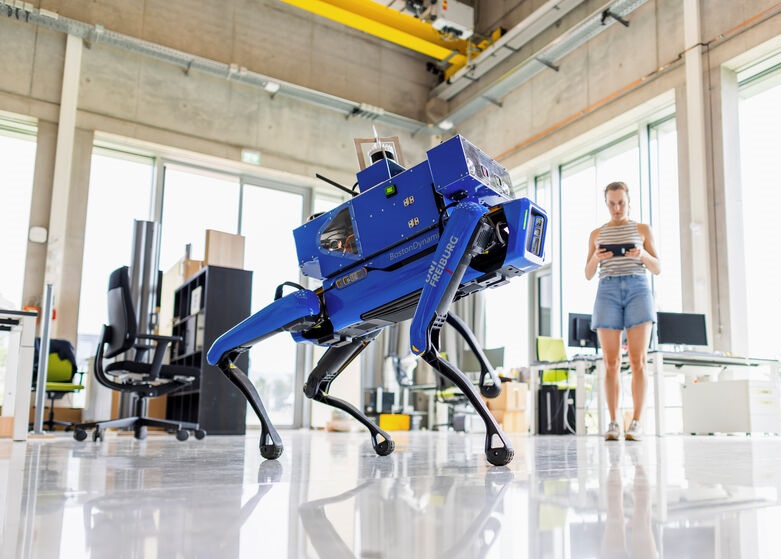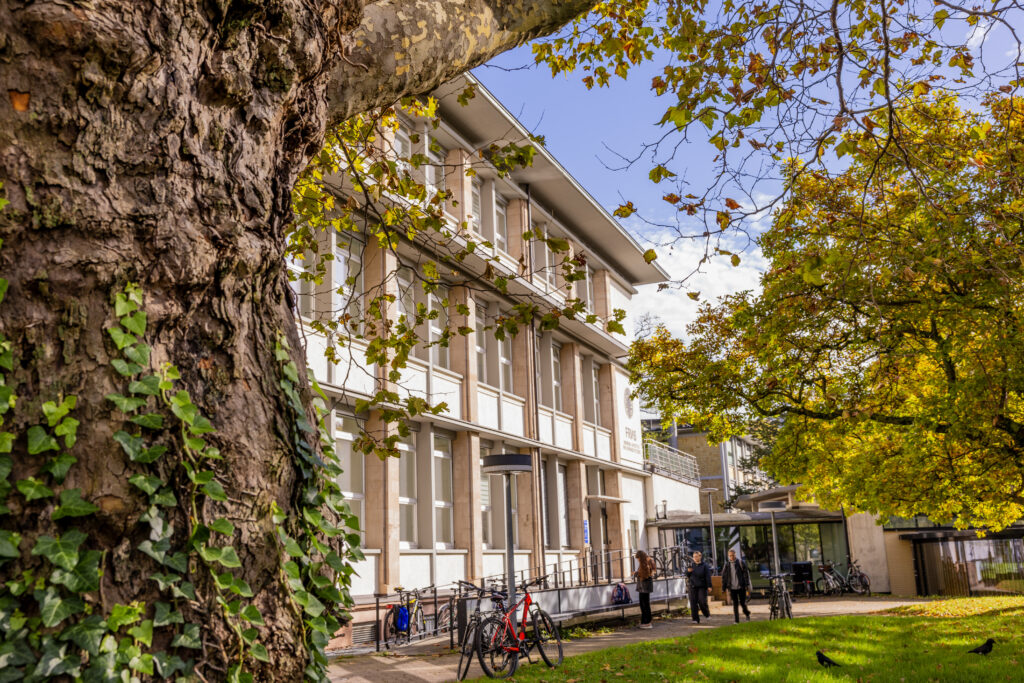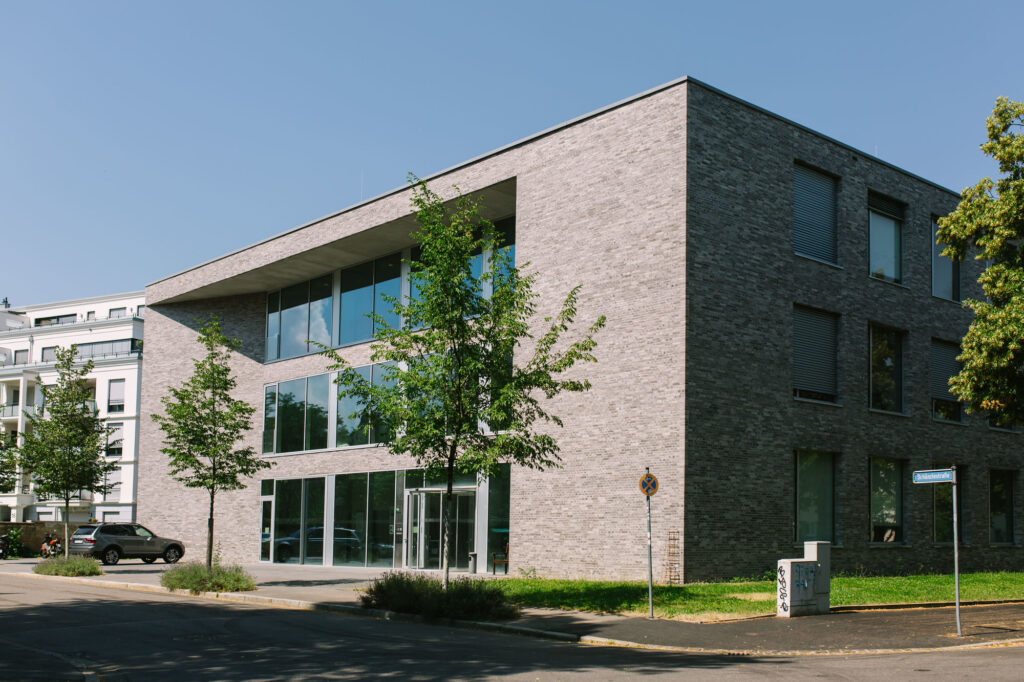Research Structures
The “heart” of the University of Freiburg beats in its faculties and research centers. They engage in both teaching and research.
However, research also takes place at the Freiburg Institute for Advanced Studies (FRIAS), the University of Freiburg’s international research center.
The research infrastructures were extensively expanded as core facilities. Key research areas and clusters of excellence benefit from new research buildings and resource centers.
Research at the Faculties
Specialists Between the Disciplines.
Interdisciplinary research is at the core of the university’s 21 research centres. They testify to the high standing of excellent research at the University of Freiburg. An outstanding international reputation and intensive international exchange are a matter of course.

Research Centres:
-
Africa Centre for Transregional research (ACT)
-
Bernstein Center Freiburg (BCF)
en
-
BIOSS Centre for Biological Signalling Studies
-
BrainLinks-BrainTools
-
Center for Transcultural Asian Studies (CETRAS)
-
Centre for Security and Society (CSS)
-
CIBSS – Centre for Integrative Biological Signalling Studies (Cluster of Excellence)
-
Frankreich-Zentrum (FZ)
-
Freiburg Materials Research Center (FMF)
-
Freiburg Center for Data Analysis and Modeling (FDM)
-
Freiburg Center for Interactive Materials and
Bioinspired Technologies (FIT)
-
livMatS – Living, Adaptive, and Energy-Autonomous Materials Systems (Cluster of Excellence)
-
The Hermann Paul Centre for Linguistics (HPCL)
-
Freiburg Interdisciplinary Center for Ethics (EZ)
-
Medieval Studies Center (MAZ)
-
Nietzsche Research Centre (NFZ)
-
Centre for Anthropology and Gender Studies (ZAG)
-
Centre for Business and Law (ZBL)
-
Centre for Renewable Energy (ZEE)
-
Centre for Medicine and Society (ZMG)
-
Center for Popular Culture and Music (ZPKM)
Freiburg Institute for Advanced Studies (FRIAS)

The Freiburg Institute for Advanced Studies (FRIAS) is the University of Freiburg’s international research center. An integral part of the university, the institute unites under its roof the humanities and social sciences, medicine, the natural and life sciences, and engineering. FRIAS offers leading academics (senior fellows) as well as outstanding early-stage researchers (junior fellows) from Freiburg and around the world the opportunity to concentrate exclusively on their (individual or joint) research projects for a certain period of time.
In this way, the institute creates a unique space and atmosphere for research within the university. It strengthens worldwide networks and enhances the University of Freiburg’s international visibility with its international Marie S. Curie Fellowship Program as well as research collaborations with the Universities of Strasbourg, Nagoya, and Pennsylvania. Moreover, FRIAS holds special events geared toward non-specialists – particularly students, but also the broader public in the City of Freiburg – to illustrate the great relevance of research projects being conducted at FRIAS for society as a whole.
Research Infrastructures
State-of-the-art technologies and their further development are of fundamental significance for top-level research. The University of Freiburg has thus given high priority to a continuous development of research infrastructures in the past years. In particular, this includes the establishment of core facilities designed to guarantee professional and efficient operations.
The University of Freiburg differentiates between three categories of facilities:
Central Facility
- Central Data Facility
The Central Data Facility (CDF) is a central service and advice centre for all members of the University of Freiburg for the handling of research data.
The facility- coordinates the University’s existing structures and services (particularly those of University IT Services and the University Library);
- works across disciplinary boundaries;
- promotes the use of modern approaches to data analysis;
- supports the University’s connection with national and international projects, structures, and services, such as the German Network for Bioinformatics Infrastructure (de.NBI), the National Research Data Infrastructure (NFDI), or the European Open Science Cloud (EOSC).
Core Facility
Core facilities provide state-of-the-art large-scale research equipment for a large cross-faculty group of users. Core facilities are operated by qualified staff and offer users comprehensive services (e.g., analyses, methodology development, training courses, and access to equipment). They have their own user regulations and are generally located at a research centre.
Shared Facility
Shared facilities are operated by individual researchers or groups of researchers to guarantee access to state-of-the-art large-scale research equipment for a larger group of users. Shared facilities have their own user regulations and are generally located at a faculty.
Faculty of Biology:
Faculty of Chemistry and Pharmacy:
Faculty of Economics and Behavioural Sciences:
Faculty of Engineering:
Research Infrastructure Networks
The University of Freiburg also promotes the establishment of research infrastructure networks to support researchers in their work. The networks are not limited to Freiburg but also operate nationally and internationally:
International networks:
National Networks:
-
German Network for Bioinformatics Infrastructure (de.NBI)
-
National research data infrastructure (NFDI)
-
-
DataPlant (host university)
-
NFDI4BIOIMAGE (co-host university)
-
NFDI4Energy (co-host university)
-
DAPHNE4NFDI (further involvement)
-
NFDI4Culture (further involvement)
-
NFDI4Earth (further involvement)
-
NFDI4Health (further involvement)
-
NFDI4ing (further involvement)
-
NFDI-MatWerk (further involvement)
-
PUNCH4NFDI (further involvement)
-
Text+ (further involvement)
-
University-internal networks:
Partnerships
Regional and international partnerships with other universities and non-university research institutes as well as companies and foundations strengthen research at the University of Freiburg. On this page, we present a few selected partnerships.

Fraunhofer-Gesellschaft
Freiburg is the largest Fraunhofer location in Germany, and the University of Freiburg collaborates with all five local Fraunhofer institutes on research projects covering a wide range of topics, including energy, security, environment, production, and mobility.
In October 2016, the Department of Sustainable Systems Engineering (INATECH) was founded as the third department at the University of Freiburg’s Faculty of Engineering in cooperation with all Freiburg Fraunhofer institutes. It represents a qualitatively new and outstanding step in the University’s cooperation with the Fraunhofer-Gesellschaft in the areas of research and teaching. Eight of the nine professorships at the institute were realized in the form of joint appointments.
Hahn-Schickard
Hahn-Schickard is an important cooperation partner of the University of Freiburg’s Department of Microsystems Engineering (IMTEK) at the critical interface between basic research, applied research, and market-relevant product development in the field of microsystems technology. The Hahn-Schickard Institute Freiburg is located in a new building on the campus of the Faculty of Engineering. This physical proximity makes it possible for the two institutions to further intensify their close collaboration in research and teaching.


Max Planck Society for the Advancement of Science
Members of the Max Planck Institute for the Study of Crime, Security, and Law (MPI-CSL) are associated with the University’s Centre for Security and Society (CSS). The Max Planck Institute of Immunobiology and Epigenetics (MPI-IE) is involved in numerous joint projects at the University, such as the Cluster of Excellence CIBSS and the Spemann Graduate School of Biology and Medicine (SGBM). In addition, both Freiburg Max Planck institutes are collaborating on projects in the context of the Excellence Strategy.
Affiliated Institutes
Affiliated institutes are independent institutions that are closely connected to the University at the organizational level. Institutes focused on research make an important contribution as a connecting link between the University and non-university institutions, for example in the area of collaborative research.
The Arnold Bergstraesser Institute (ABI) is one of Germany’s major research centres in the fields of comparative areas studies and transregional studies. The institute was founded in 1960 and goes back to Arnold Bergstraesser, at that time a University of Freiburg professor of political science and sociology.
The Walter Eucken Institute is a nationally renowned centre of excellence for basic research on constitutional economics and ordoliberal thinking. As an independent institution, the institute conducts economic and social scientific research in the tradition of the Freiburg School of Ordoliberal Economics.

Named and Endowed Professorships
Private sponsors and charitable foundations are important partners for research at the University of Freiburg. The awarding of named professorships provides funding for already established Professorships. Endowed professorships enable the University of Freiburg to develop new topics and sharpen research profiles:
Current endowed professorships:
- Professorship for Forest Genetics at the Faculty of Environment and Natural Resources; endowed by the Eva Mayr-Stihl Foundation
- Professorship for Smart Systems Integration at the Faculty of Engineering; endowed by the Georg H. Endress Foundation
Current named professorships:
- Professorship for Energy-Efficient High-Frequency Electronics at the Faculty of Engineering; endowed by the Fritz Hüttinger Foundation
- Professorship for Power Electronics at the Faculty of Engineering; endowed by the Gips-Schüle Foundation
- Professorship for Sustainable Systems Engineering at the Faculty of Engineering; endowed by the Gips-Schüle Foundation
- Professorship for Multi-Scale Characterization of Materials Systems at the Faculty of Engineering; endowed by the Eva Mayr-Stihl Foundation
- Professorship for Economic Policy and Constitutional Economic Theory at the Faculty of Economics and Behavioural Sciences; endowed by the dm-Werner Foundation
